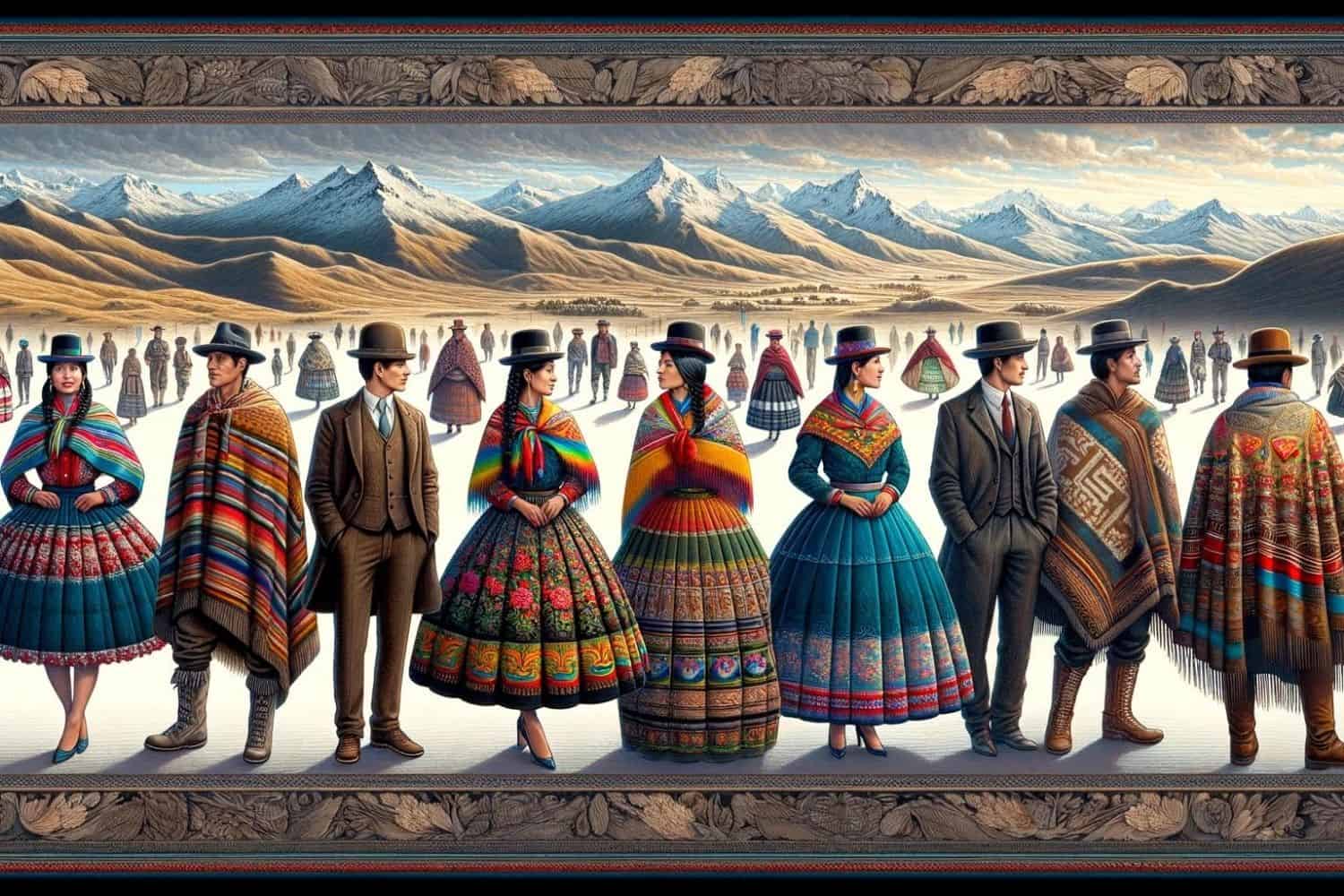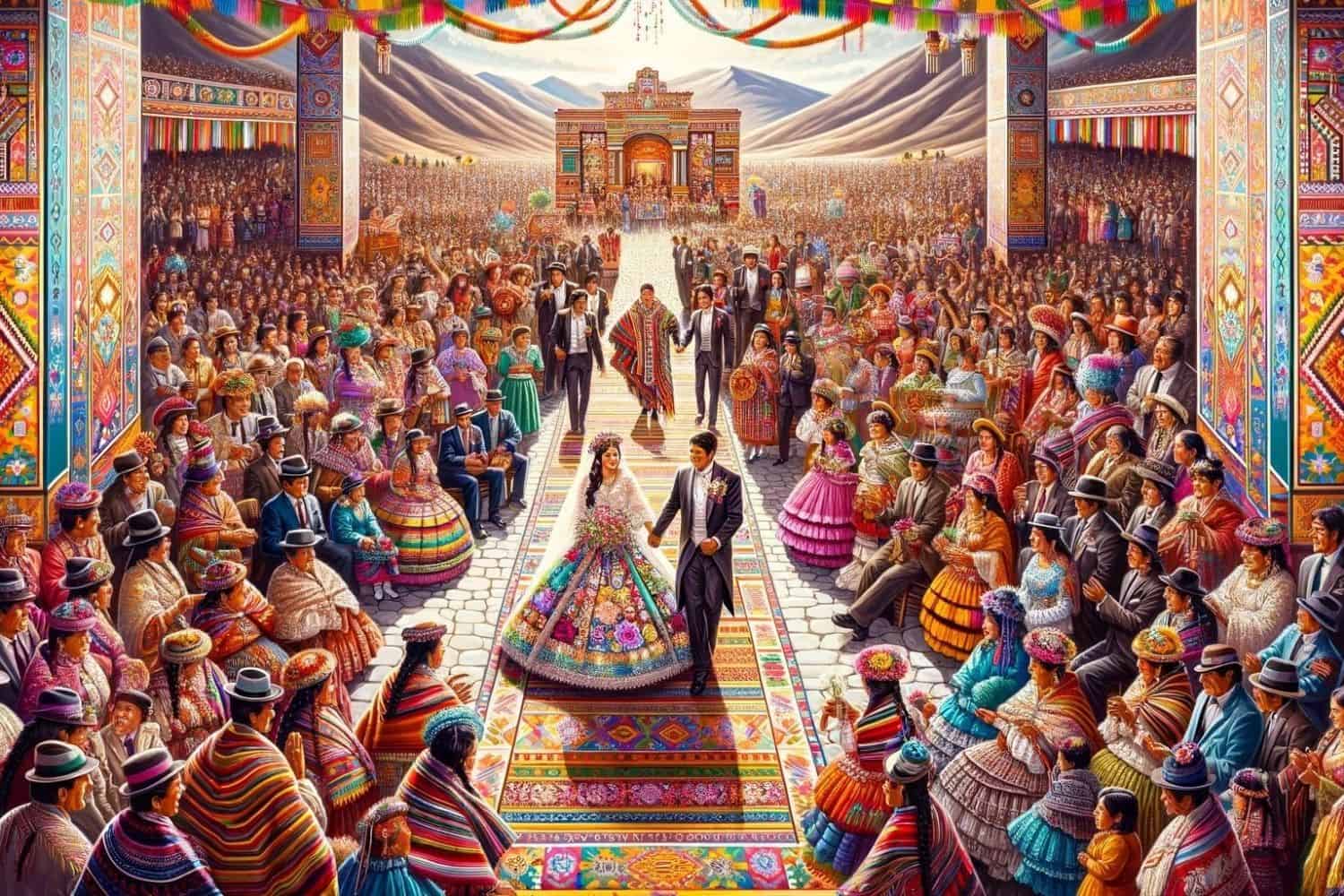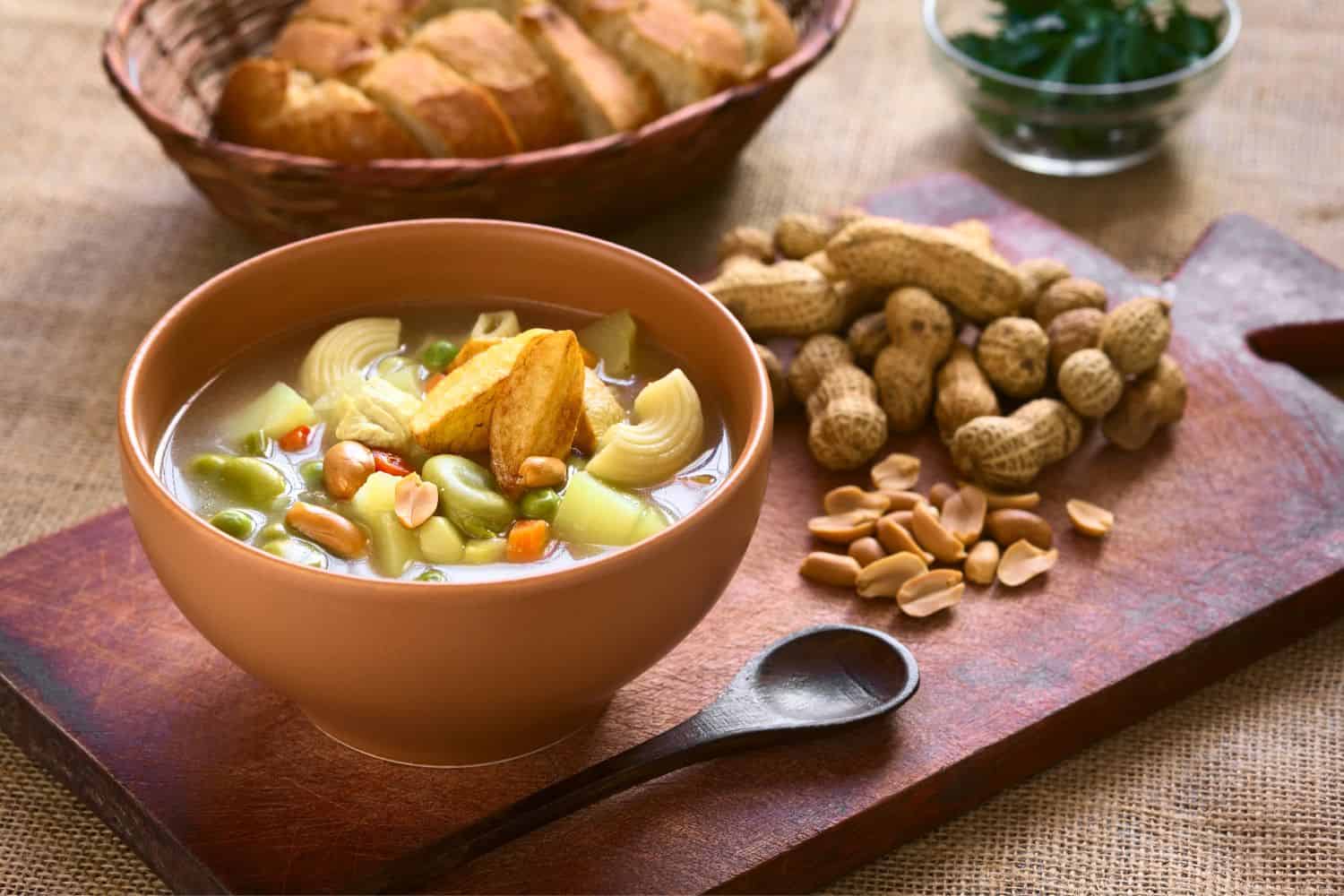Table of Contents
Explore Bolivia Culture as we offer you a comprehensive look into the customs of Bolivia, showcasing its rich and vibrant heritage, which includes traditions, values, and unique customs and practices.
Bolivians prioritize hospitality and warmly welcome guests into their homes. Family holds a central place in Bolivian society, fostering strong connections and a strong sense of community. It’s essential to acknowledge that Bolivia culture is in a constant state of development, influenced by historical events, regional dynamics, and global interactions.
Gaining insight into the culture of Bolivia can provide valuable understanding of the intricate and diverse society within the country.
Bolivia Culture
Here are the most important points to begin learning about Bolivia culture and customs:
- Ethnic Diversity: Bolivia is home to a diverse mix of ethnic groups, each with its own customs and traditions. The major ethnic communities include indigenous Bolivians, mestizos, and people of European descent.
- Languages: The official languages of Bolivia are Spanish and various indigenous languages, including Quechua and Aymara. Numerous regional languages and dialects are spoken throughout the country.
- Religious Practices: Bolivia is a predominantly Catholic country, and Catholicism plays a significant role in Bolivia culture. Many Bolivians participate in religious festivals, processions, and ceremonies.
- Greeting Etiquette: Greetings are important in Bolivia culture. Handshakes are common between men, while men and women may shake hands or greet each other verbally with polite phrases.
- Traditional Clothing: Traditional Bolivian clothing varies by region and ethnicity. Indigenous communities often wear distinctive attire that reflects their cultural heritage, such as colorful Andean clothing and bowler hats for women.
- Cuisine: Bolivian cuisine features dishes like salteñas (stuffed pastries), llajwa (spicy salsa), and a variety of stews. It reflects a blend of indigenous, Spanish, and Andean flavors.
- Hospitality: Bolivians are known for their warm hospitality. When guests visit, they are often offered traditional Bolivian food and beverages.
- Respect for Elders: Respect for elders is an important custom in Bolivian society. Younger individuals show deference to their seniors through words and actions.
- Arts and Crafts: Bolivia has a rich tradition of arts and crafts, including textiles, pottery, and silverwork. Indigenous artisans create intricate and beautiful handmade goods.
- Music and Dance: Traditional Bolivian music includes instruments like the charango and panpipes. Folk dances, such as the Cueca and Morenada, are an integral part of cultural celebrations.
- Celebration of Festivals: Bolivians celebrate various religious and cultural festivals, such as Carnival, Inti Raymi, and Todos Santos. These celebrations often involve traditional dances, music, and colorful parades.
- Family and Community: Family is central to Bolivian society, and strong community bonds are essential for support and social cohesion.
- Gender Roles: Traditional gender roles exist in Bolivian society, with men and women often having distinct roles and responsibilities. However, changes are occurring, particularly in urban areas.
- Marriage and Relationships: In Bolivia, marriage is considered a significant commitment, and family approval is important. Arranged marriages are less common than in some other cultures, but family input is valued.
- Cultural Influences: Bolivia culture has been influenced by a mix of indigenous traditions, Spanish colonial heritage, and modern influences. This blend has created a unique and vibrant cultural landscape.
These customs are essential aspects of Bolivia culture and are readily visible in everyday life, reflecting the country’s rich cultural heritage and the diversity of its people and traditions.
Bolivia Traditional Attire
Bolivia’s traditional attire reflects the country’s diverse cultural heritage, regional variations, and historical influences. The clothing worn by Bolivians not only serves functional purposes but also carries significant cultural and social meanings.

1. Regional Variation: Bolivia’s traditional clothing varies from region to region, influenced by the local climate, lifestyle, and ethnic traditions. In the colder highland areas, people tend to wear heavier and more layered garments, while in the warmer lowland regions, lighter clothing is preferred.
2. Aymara and Quechua Dress: The traditional attire of indigenous groups like the Aymara and Quechua often includes the “pollera” for women, which is a full, colorful skirt, paired with a matching shawl and bowler hat. Men may wear a “chullo,” which is a knitted hat with earflaps, and a poncho. Both men and women in these communities may also use intricate woven belts to carry various items.
3. Cholita Fashion: Cholitas are indigenous Bolivian women who have embraced their cultural heritage and incorporated it into their daily clothing. They often wear layered skirts, blouses, and distinctive bowler hats. The cholita fashion has become a symbol of pride and empowerment among indigenous women.
4. Indigenous Ethnic Groups: Bolivia is home to many indigenous ethnic groups, each with its distinctive traditional attire. For instance, the Guarani people may wear feathered headdresses and vibrant, patterned clothing, while the Yuracaré people might have unique weaving and embroidery styles.
5. Modesty and Cultural Significance: Traditional Bolivian clothing emphasizes modesty, with loose-fitting garments covering the body. The choice of colors, fabrics, and embroidery often carries cultural and regional significance, and the attire may also indicate one’s social or marital status.
6. Special Occasion Attire: Bolivians dress elaborately for special occasions and celebrations, with vibrant and ornate clothing adorned with intricate beadwork, embroidery, and jewelry. Festivals, religious events, and traditional ceremonies are opportunities for individuals to showcase their finest traditional attire.
7. Adaptation to Modernity: While traditional attire remains important, urbanization and modern influences have led to the integration of Western clothing in daily life, especially in cities like La Paz and Santa Cruz. Many Bolivians wear a combination of traditional and contemporary clothing, reflecting changing lifestyles and global fashion trends.
Bolivia’s traditional attire is a vivid expression of the country’s cultural diversity, history, and identity. It serves as a visual testament to the rich tapestry of traditions that have shaped Bolivian society for centuries.
Bolivia Marriage Traditions
Bolivian marriage traditions are deeply rooted in the country’s rich cultural and ethnic diversity, with variations across different regions and indigenous groups. These traditions hold great significance in Bolivian society, reflecting both historical practices and contemporary influences.

1. Arranged Marriages: Arranged marriages are a common practice in Bolivia, particularly among indigenous communities. Families often take an active role in selecting suitable partners for their children, emphasizing the importance of cultural compatibility and family connections.
2. Matchmakers: Matchmakers, known as “casamenteros” or “yunzas,” play a crucial role in facilitating unions between couples. They consider factors like family background, social status, and shared traditions when suggesting potential matches.
3. Engagement: Once a suitable match is found, the engagement process begins with a formal agreement between the families. This agreement, often called “pedida de mano,” marks the commitment of the couple to marry.
4. Wedding Celebrations: Bolivian weddings are vibrant and festive events that can last for several days. They typically feature traditional rituals, music, dance, and a variety of local dishes. The main wedding ceremony, known as the “boda,” involves the exchange of vows and rings, often held in a church or community gathering place.
5. Bride Price (Dote): In some Bolivian communities, it is customary for the groom to provide a “dote” or dowry to the bride’s family as a symbol of commitment and financial support. The dote can vary in form and significance depending on regional customs.
6. Bridal Attire: Brides in Bolivia often wear colorful and intricately designed dresses that reflect their cultural heritage. The style of bridal attire varies widely among indigenous groups, such as the Aymara, Quechua, and Guarani, each with its distinct traditional garments.
7. Post-Wedding Customs: After the wedding ceremony, various traditions may continue, including a celebratory feast with family and friends. Some indigenous communities may have specific rituals to mark the bride’s entrance into her new household.
8. Social and Cultural Significance: Marriage in Bolivia is not only a social contract but also a reflection of cultural identity and heritage. Many wedding ceremonies incorporate indigenous customs and rituals that have been passed down through generations.
9. Family and Community Involvement: Bolivian weddings are community affairs, with extended families and the broader community playing essential roles in supporting and participating in the festivities. Community members often come together to help with preparations and celebrate the union.
10. Contemporary Changes: In urban areas and among younger generations, there is a growing trend toward love marriages, where individuals choose their partners based on personal preferences. However, even in these cases, Bolivian couples often incorporate traditional customs and ceremonies into their weddings to honor their cultural roots.
Bolivian marriage traditions showcase the importance of family, community, and cultural heritage in Bolivian society. These practices, influenced by indigenous customs and modern influences, continue to be a significant aspect of Bolivian life, preserving the country’s cultural diversity and social bonds.
Bolivia Food Culture
Bolivia food culture is a captivating and diverse reflection of its history, geography, and the fusion of culinary traditions from various regions of South America.

- Regional Variation: Food from Bolivia diverse geography, ranging from fertile valleys to arid highlands, has led to a wide range of regional cuisines. Each region incorporates local ingredients and cooking techniques, creating a rich tapestry of flavors.
- Staple Foods: Bolivian cuisine relies heavily on staple foods like rice, corn, potatoes, and quinoa. Corn-based dishes like “saice” and “salteñas” are particularly popular.
- Grilled Meats and Alpaca: Grilled meats, especially beef and alpaca, are a hallmark of Bolivian cuisine. These meats are often seasoned with spices and herbs before grilling.
- Flavorful Spices: Bolivian cuisine incorporates a range of spices and herbs, including aji pepper, cumin, oregano, and huacataya (a local herb). These ingredients contribute depth and complexity to dishes.
- Traditional Dishes: Bolivian cuisine features traditional dishes like “salteñas” (meat-filled pastries), “anticuchos” (marinated skewered meats), “tucumanas” (stuffed pastries), and “chuño” (freeze-dried potatoes). These dishes may have regional variations.
- Use of Cheese: Cheese is a common ingredient in Bolivian cuisine and is used in dishes like “salteñas” and “humintas” (cheese-filled tamales).
- Baking in Clay Ovens: Clay ovens are frequently used for baking bread, empanadas, and other baked goods in Bolivia.
- Sweets and Desserts: Bolivian sweets often incorporate ingredients like honey, molasses, and tropical fruits. “Cuñapé” and “majadito” are popular desserts, especially during celebrations.
- Tea and Herbal Infusions: Bolivians have a rich tradition of herbal teas, with coca leaf tea being a notable example. Herbal infusions are often enjoyed for their medicinal properties and flavor.
- Family and Community Dining: Bolivia culture places great importance on communal dining. Families and friends gather around a table to share meals, often served on a “mantel” (tablecloth).
- Influence of Bolivian Diaspora: Bolivian cuisine has gained recognition and popularity in various parts of the world due to the Bolivian diaspora. Bolivian restaurants in international cities offer a taste of Bolivia culture to diverse audiences.
- Resilience and Adaptability: Despite various challenges, Bolivian cuisine has endured and adapted over the years. Bolivian cooks demonstrate resourcefulness in creating delicious dishes even in demanding circumstances.
Book our services
These guiding services ensure that your journey is not only enjoyable but also informative and hassle-free. Bolivia’s cultural delights, historical marvels, and natural wonders await your exploration with RJ Travel LLC. Our Bolivia Private Tours are designed to immerse you in the rich cultural heritage, historical significance, and breathtaking landscapes of this extraordinary nation.
Contact Us and our team will make sure to help you plan your trip to Bolivia when it’s safe and ready for travel. Whether you’re interested in joining a pre-arranged Bolivia small group tour or creating a custom itinerary, we are here to make your Bolivian adventure an unforgettable reality.
More About Bolivia
[the-post-grid id=”50345″ title=”Bolivia Main page”]
Book Your Trip to Bolivia Today!
Embark on an unforgettable journey and explore the allure of Bolivia through our exclusive tours.
